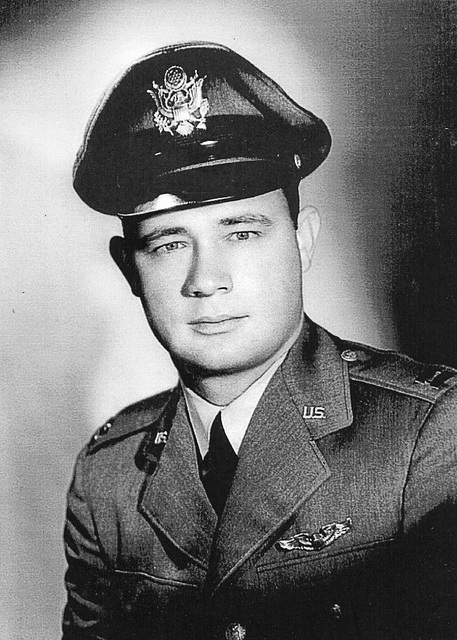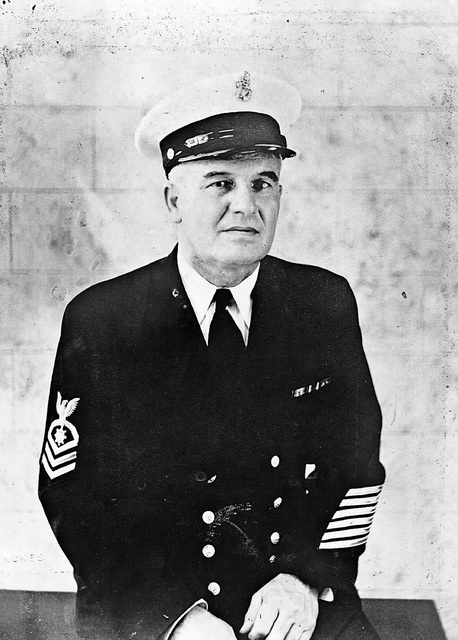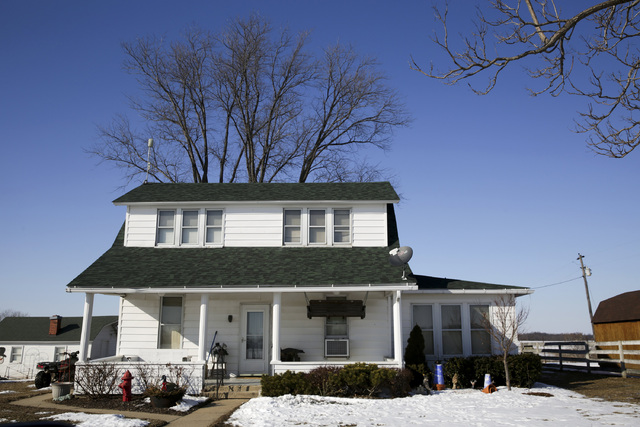Memorializing WWII brothers a race against time for the last surviving one
HILLVIEW, Ill. — Seventy-two Aprils ago, George Powell left the family farm on the outskirts of this tiny town southwest of Springfield and joined the military, a fairly common endeavor for young American men in the months after the U.S. entered World War II.
The rare thing about Powell’s service was the lineage it kept intact. From 1939 to 1944, seven Powell brothers joined the military, a fairly astonishing number and one that caught the attention of a local lawmaker who wants to honor the family’s service by renaming a road through their home county in west-central Illinois after the brothers.
But the formal resolution to name about 35 miles of U.S. Route 67 in Greene County the Powell Brothers Memorial Highway has gotten buried in the legislative process in Springfield — and it’s a race against time.
George Powell is the last survivor among the Powell brothers and lone surviving sibling of the 13 Powell children. He’s also 99 years old, living in a Traverse City, Mich., rehabilitation center.
Meanwhile, the number of World War II vets continues to decline. The Department of Veterans Affairs estimates that 550 veterans from that conflict die every day, and that 1.2 million of the 16 million who served in the war are alive today.
Powell is trying to recuperate from recent health setbacks and hoping he can attend the renaming, whenever it occurs.
“I want to go,” he said on a sunny afternoon last week at the Grand Traverse Pavilions rehab center. “But I don’t know if I’ll be able to do it. I’m not as rough and ready as I used to be.”
Military records show that at least six of the Powell brothers — Earl, Fred, George, Everett, Max and Adrian — served in some of the more active corridors of World War II. Oldest brother Arthur, who served on a minesweeper in World War I, returned to active duty in 1939 as a recruiter.
George, fourth oldest of the seven, was an aviation mechanic on various Pacific islands, including Guadalcanal, and an aerial gunner. Everett was a fighter pilot who was shot down and became a prisoner of war in Europe. Max was a pilot who flew reconnaissance missions in the Pacific.
An eighth brother was set to enlist, but the war ended before he entered service.
During the years the seven brothers were away, the remaining Powells kept the farm running, said Jim Powell, son of George’s brother Fred, who served as a gunner’s mate on the USS Sturgis troop carrier.
The family was a stoic, conservative and highly patriotic group, recalled Jim Powell, while seated in an upstairs den in his home in Whitehall, a few miles from the family’s original farmhouse, which is still standing today. He said he doubted the brothers or their family gave much thought to their service.
“I think it was the thing to do at the time,” he said, adding that the 1941 attack on Pearl Harbor inspired millions of young men to enlist. Jobs were scarce, and young men were restless to leave the farm, he said.
“They weren’t the only family to make a sacrifice,” Jim Powell said. “It’s just that they had more of them.”
A particularly trying time for the family came in March 1944, when Everett, the fighter pilot, was shot down over Belgium and was missing. Jim Powell and other relatives say Everett’s mother suffered a heart attack when she received the news, but rejoiced when her son was liberated in May 1945.
All seven brothers returned to the farm, albeit at different times and for different lengths of stays, relatives recalled. No large, civic celebration occurred. Like many World War II veterans, the Powell brothers rarely spoke of their service, Jim Powell said.
Four of the brothers went on to become career military men, one of whom retired from the service and was elected Greene County sheriff.
Shortly after his return, George Powell took a job at an auto body manufacturing plant in Lansing, Mich., then found work as an investigator for the state liquor control commission.
He married and, with his wife, Lillian, raised two daughters. By the time he retired in 1978, George Powell had become the state liquor commission’s district supervisor for northern Michigan. Lillian died in 2012.
George Powell remained in his home until he suffered a mild heart attack at age 97, his daughter Paula Prusick said. About the same time, he stopped driving.
Since then, Powell has been in and out of the residential rehabilitation center, undergoing surgery to remove a clot in November, then returning home briefly before heading back to the center in mid-January after suffering weakness, Prusick said.
He remains remarkably sharp, correcting her on important dates in his military service and professional career.
“I’m always laughing,” said Prusick, 60. “When I take him shopping, I’ll have him read the tags for me.”
Powell was able to recall his exact date of enlistment — April 14, 1942 — and said he joined the military because, “I knew that the draft would be coming for me.”
He recalled harrowing trips on a destroyer from one Pacific island to the next while taking enemy fire and enduring rough weather.
Powell was still in the service when the war ended: “We really celebrated and had a few drinks where we were able to get them.”
He joked that his secret to longevity is drinking one martini a day.
“I guess it’s all right,” he said of the pending honor, “but I’m not carried away by it. I’m proud of it, but there’s a million others who are deserving of the same thing. So, why choose us?”
For years, the brothers’ siblings and children had talked about creating a formal honor for the men, said George Powell’s nephew Tom Murgatroyd, a retired Air Force colonel living in Sherman, Ill., near Springfield.
While going through his mother’s belongings after she died last year, two weeks shy of her 100th birthday, Murgatroyd found a small pennant stitched with seven stars — a symbol displayed by families to show that a loved one is serving in the military.
“She was very, very proud of the family’s service and all of her brothers,” Murgatroyd said of his mother, Ruth Powell Murgatroyd. “We thought we ought to do something more than put that flag on a wall someplace.”
Murgatroyd contacted U.S. Sen. Dick Durbin, who years earlier had appointed Murgatroyd to a committee screening service academy applicants, and Durbin came up with the idea of reading a statement on the floor of the Senate honoring the Powell brothers’ service. The senator recited the proclamation in May, a gesture that state Sen. Sam McCann, R-Carlinville, noted.
Around that same time, Jim Powell’s son, John, collaborated with his father and uncles to compile a 290-page, bound scrapbook on the brothers’ service. The book, which the men distributed to relatives, contains military records, including Everett’s POW identification card, and photos.
A few days after Durbin’s proclamation, McCann surprised the Powell family by introducing the highway renaming resolution, which the state Senate adopted. But the House adjourned before voting on it, and the measure died. In January, McCann reintroduced it in the Senate, and the resolution remains in the Assignments Committee, which sends measures to their appropriate committee.
McCann said he wrote letters to the chairman of the committee and the chief of staff of Senate President John Cullerton earlier this month asking for the resolution to be assigned to an appropriate committee.
“I do get that time is of the essence,” McCann said. “I’m trying to get my colleagues to get it.”
Precisely how rare it is that seven brothers served in World War II is an open question. Multiple siblings’ military service in World War II was relatively common, historians say.
At least one family — eight Fedele brothers from the Rochester, N.Y., area — outnumbers the Powells in WWII military service.
The theme of brothers’ service is a powerful and poignant one, captured by Steven Spielberg’s popular 1998 film, “Saving Private Ryan,” in which a group of soldiers travels behind enemy lines to retrieve a paratrooper whose three brothers were killed in combat.
The film is thought to be based on the true story of the Niland brothers from Tonawanda, N.Y., near Buffalo. Two of the brothers were killed at the Normandy invasion, and a third was shot down over Burma. The fourth brother was retrieved from combat and sent home.
In Waterloo, Iowa, the heartbreak of losing several siblings in WWII combat is real. Five Sullivan brothers from the town in the northeast portion of the state died in November 1942 when their light cruiser, USS Juneau, was sunk in a battle with the Japanese. The Sullivan Brothers Iowa Veterans Museum in Waterloo honors the Sullivans and Iowa veterans from the Civil War to the present.
Record or not, a family that had seven brothers serve in — and return alive from — World War II is rare.
“For one thing, the vast majority of families did not have seven sons,” John McManus, author of 11 books on military history and a professor at Missouri University of Science and Technology, said in an email. “Among those that did, usually some of the brothers would have been overage or underage. Plus, it was possible to get a draft deferment for physical problems or emotional problems or as a worker in a war-essential industry or to run a family farm.”
The Powells had plenty of extra hands to help at home. Besides the seven brothers who went to war, four other brothers and two sisters remained at the farm.
The farmhouse and its surrounding 80 acres on the outskirts of Hillview remain in the Powell family today, owned by Jim Powell and occupied by his sister and her family. It is a working cattle farm.
In 1988, the town honored the Powells by placing a plaque and a flagpole in its tiny park.
But Hillview has endured some difficult years, which many trace to the 1993 flooding of the nearby Illinois and Mississippi rivers. Much of the town was under several feet of water, and the population, once as high as nearly 300, now stands at fewer than 200.
Last winter, a storm snapped off the flagpole next to the Powell family plaque.
“They’re all just such wonderful people,” said Mary Ann Farris, owner of the Hillview Cafe, the town’s only business. “Hardworking, everyday people, down to earth and loyal to their families.”
She said everyone in the area is aware of the Powells’ military service — several of the original 13 siblings’ sons also served in the military — and renaming the highway would be considered an honor for the entire community.
“This way, we might be gone,” she said, “but there’s going to be something. The name and what they did together carries on.”





